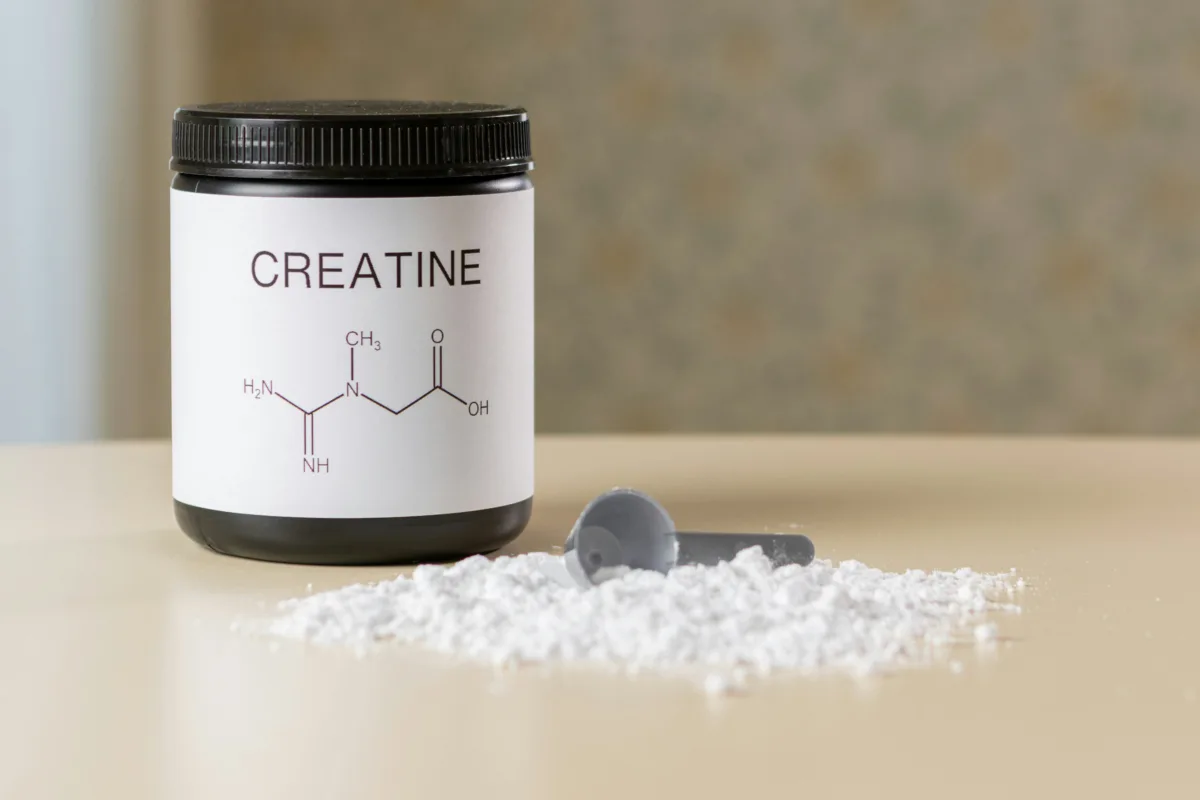🧬 What is Creatine?
Creatine is a natural compound made from three amino acids: arginine, glycine, and methionine. It’s produced in small amounts by your liver and kidneys and stored mostly in your skeletal muscles, where it’s used to generate rapid energy for short bursts of high-intensity activity.
You also get small amounts of creatine from foods like red meat, fish, and poultry, but supplementing boosts your levels much higher—leading to measurable improvements in strength, endurance, and recovery.
💪 Science-Backed Benefits of Creatine
🔋 1. Improved Strength and Power Output
Creatine increases the availability of ATP (adenosine triphosphate), the primary energy molecule in your body. This is especially important during heavy lifting or sprinting, where quick energy is essential.
✅ Evidence: Studies show that creatine can boost maximal strength and performance in high-intensity workouts by 10–20%.
🏋️ 2. Faster Muscle Growth
Creatine stimulates muscle cell hydration and increases training volume, which contributes to hypertrophy (muscle growth). You’ll be able to perform more reps, lift heavier, and recover faster.
🔬 Study Insight: Creatine users typically gain 1–2 kg more lean muscle mass in 4–12 weeks compared to non-users.
🧠 3. Boosted Brain Function
Surprisingly, your brain also benefits from extra ATP. Supplementing creatine can enhance cognitive function, especially in mentally demanding tasks or during sleep deprivation.
🧪 Interesting Finding: In one study, creatine supplementation improved working memory and mental fatigue resistance in young adults and vegetarians.
🧘 4. Faster Recovery and Less Fatigue
Creatine reduces inflammation, cell damage, and muscle soreness, making it a valuable aid in post-workout recovery.
💡 This means you can train harder, more often—with less downtime.
👴 5. Anti-Aging & Neuroprotection
In older adults, creatine has been shown to improve muscle strength, brain health, and may even play a role in reducing the risk of neurodegenerative diseases like Parkinson’s and Alzheimer’s.
❌ Creatine Myths—Debunked
⚠️ Myth 1: “Creatine causes kidney or liver damage.”
Truth: There is no evidence that creatine harms healthy kidneys or liver. It may increase creatinine levels in blood tests, but this doesn’t indicate damage.
⚠️ Myth 2: “Creatine causes bloating or water retention.”
Truth: Creatine draws water into your muscles, not under your skin. It can cause slight weight gain (1–2 kg), but it’s from increased muscle volume, not fat or puffiness.
⚠️ Myth 3: “Only bodybuilders or men need creatine.”
Truth: Creatine benefits anyone involved in high-intensity training—including women, vegetarians, seniors, and even students.
⚠️ Myth 4: “Creatine is a steroid.”
Truth: Creatine is not a steroid. It’s a legal, safe, naturally occurring substance—not a synthetic hormone.
💊 How to Use Creatine Correctly
✔️ Best Type:
Creatine Monohydrate is the gold standard. It’s affordable, well-researched, and proven effective. Brands like Creapure® are known for high purity.
🕒 Dosage:
🔁 Option 1: With Loading Phase
- Loading: 20g per day (4 x 5g doses) for 5–7 days
- Maintenance: 3–5g per day
🔁 Option 2: Without Loading
- Take 3–5g daily. You’ll reach muscle saturation in 3–4 weeks.
🕓 When to Take:
- Anytime is effective, but studies suggest post-workout with carbs/protein may offer slightly better results.
- Take it consistently—creatine works through muscle saturation, not timing.
💧 Hydration is Key:
Creatine draws water into muscles, so stay hydrated (at least 3–4 liters/day) to prevent cramps or discomfort.
👨⚕️ Is Creatine Safe?
Yes, for healthy individuals, creatine is safe even for long-term use. Clinical trials spanning over a decade found no adverse effects when taken as recommended.
Potential Side Effects (rare):
- Mild bloating (temporary)
- Upset stomach (if taken in excess or without water)
- Muscle cramping (due to dehydration)
Avoid or consult a doctor if:
- You have kidney disease
- You’re pregnant or breastfeeding
- You’re on medications that affect kidney function
🤔 Who Should Consider Creatine?
✅ Lifters and gym-goers
✅ Sprinters and athletes in explosive sports
✅ Vegetarians and vegans (they get less from food)
✅ Seniors for muscle retention and brain health
✅ Students or workers under high cognitive load
⚖️ Creatine At a Glance
| Benefit | Creatine Effect |
| Strength and Power | Increased ATP production |
| Muscle Growth | Promotes hypertrophy |
| Recovery | Reduces inflammation and soreness |
| Brain Function | Boosts cognition and memory |
| Safety | Safe for long-term use |
| Ideal Form | Creatine Monohydrate |
🧭 Final Tips for Success
- 🎯 Be consistent – Creatine builds up over time.
- 💧 Stay hydrated – It draws water into muscle cells.
- 📊 Track your strength – Expect gains in 2–4 weeks.
- 🥗 Pair with a proper diet – Supplements don’t replace nutrition.
🧠 Final Word: Should You Take Creatine?
If you’re aiming to gain muscle, boost energy, enhance brain function, or age better, creatine is one of the most effective and safest supplements you can choose.
It’s backed by science, affordable, and incredibly simple to use. Whether you’re a seasoned athlete, student, or beginner in fitness—creatine can elevate your performance and well-being.

